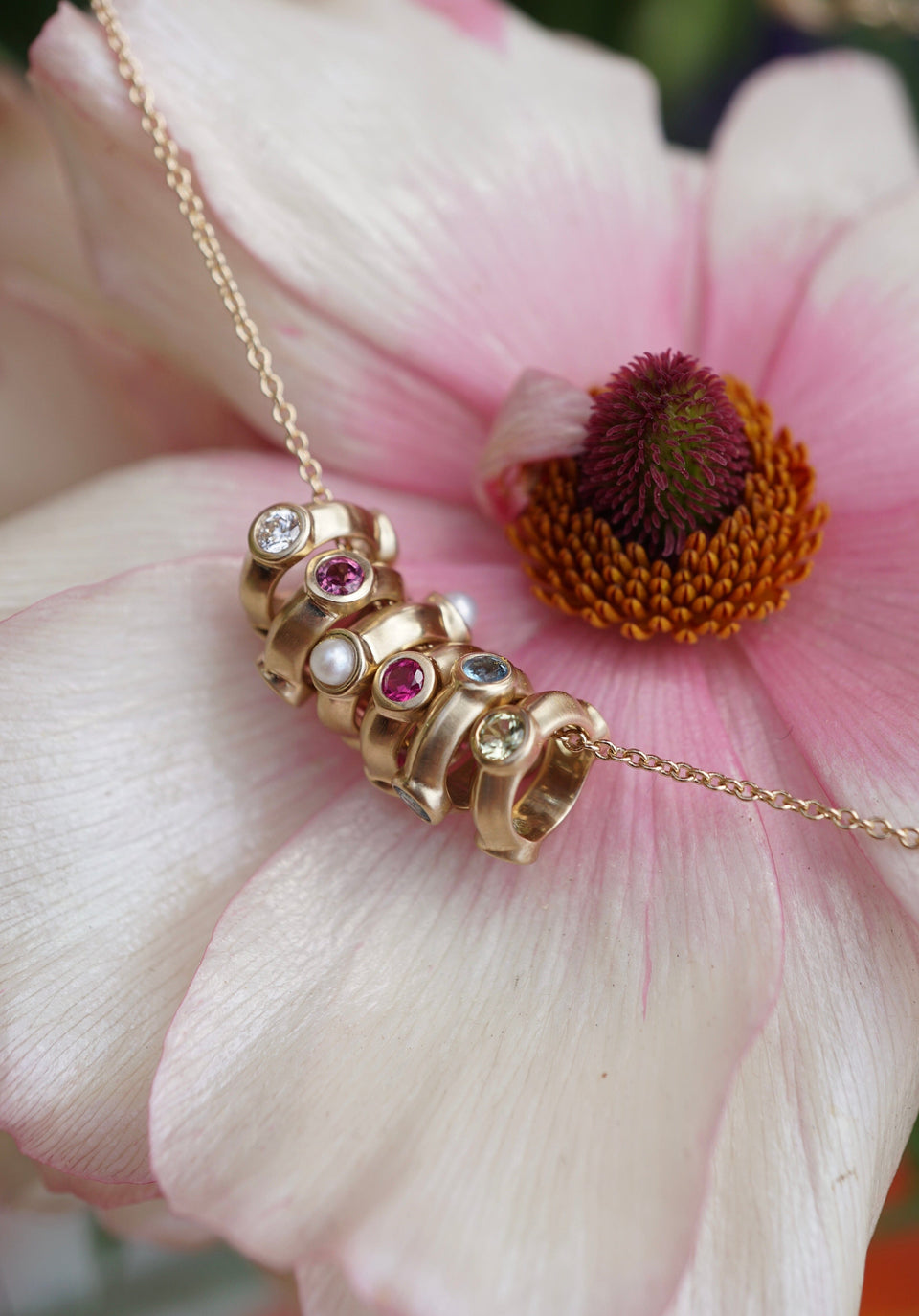Supporting Your Bleed- The Ayurvedic Approach to Menstrual Care By Iselin Amanda Stoylen
According to Ayurveda and Traditional Chinese Medicine, the time of menstruation is a period of detoxification and purification: physically, mentally, and spiritually. It’s a process that supports health, wellbeing, and longevity, especially when supported by your lifestyle. Researchers have even asked the question if the process of menstruation is a contributing factor to why women live longer than men. (I find this very interesting!) Menstruation is governed by a force that in Ayurveda is known as ‘Apana Vaju’. This is a downward moving force, bringing us down towards the Earth and in towards ourselves. During menstruation, we wish to support the downward moving energy of Apana Vaju; through the foods we eat, how we spend our time, and through our practices, the thoughts we engage with and the intentions we set.
THE THREE DOSHAS IN THE MENSTRUAL CYCLE
The menstrual cycle moves through the three dosas within a month. The time of bleeding is governed by the Vata dosha (Element of Air and a little water). The time when the uterine lining is building up, and the body is getting ready to receive a potential pregnancy is governed by kapha (Earth and water): a time of building, accumulating, and nourishing. The time of ovulation and the luteal phase is governed by pitta (Fire). In Ayurveda, opposite qualities are brought into bring balance where there is imbalance. As your period starts there is a sudden rise of vata energy in your body. Vata acts as a moving force, enabling the flow of menstruation. When Vata is active, or there is a risk of too much Vata energy in the body, it can be brought back into balance through bringing in the opposite qualities; those that are calming, grounding, warming, and nourishing. We know that too much vata energy can manifest as indigestion, anxiety, inability to concentrate, dry hair/skin/nails, struggling to find rest, and “a feeling of being up in the clouds”. It can also manifest as a scanty flow, irregular bleeding, a short luteal phase, dysmenorrhea, and in severe cases, amenorrhea. Much like Apana Vaju, Vata is supported and balanced by foods that are grounding, nurturing, and nourishing. As a general rule, foods that are light, simple, warm, well cooked, and close to the Earth supports the downward flow of Apana Vaju, and brings balance to Vata. We are looking for qualities that are heavy and grounding. A common misconception I see is interpreting “light” foods to be foods such as raw foods, smoothies, juices, and salads. Despite raw foods being deeply cleansing, they are also much harder for the body to digest. They move the energy in the body upward, which goes against the energy of menstruation and Apana Vaju, and can bring imbalance to Vata.
Specific food groups to focus on are the finds that grow close to the Earth: root
vegetables and squash are good examples. Beetroot is a beautiful vegetable to
implement during your bleeding time, as it is rich in iron, magnesium, and folate. The heavier qualities of fats and oil are particularly beneficial as we bleed; fats help us ground and are deeply nourishing and nurturing. Fats are necessary in order for our bodies to take up and assimilate many of the nutrients we take in through our foods and to nourish the tissues in the body. Some of my favorite fats include avocados, nuts and seeds (walnuts, flax seeds, sesame, and pumpkin in particular), coconut, and high-quality organic dairy such as raw goats milk and unpasteurized butter.

HONOURING YOUR BLEED
Women naturally have the ability to connect to the rhythms and cycles of Nature, as she is herself cyclical. Our wombs hold the sacred energy of ‘Shakti Prana,’ the energy that gives life to all of creation. Shakti Prana is a Divine energy of insight, power, wisdom, and carrier of life itself. In Ayurveda, it is often referred to the time of menstruation as the time of the black moon. This window is revered to be a sacred time of insight, sight, intuition, and clarity. When a woman bleeds, her Shakti Prana is in itself revitalized and cleansed. It is as much a physical detox and purification as it is emotional and mental. This process can be supported and enhanced, or it can be slowed down by our lifestyles, activities, and diets.
The more attention and care we give to the process of menstruation, the more profound effects this time may potentially be. Essentially, the time of bleeding is a time for introspection, to pause, and to invite a deeper sense of connection into our lives. It is a time of remembering and of understanding the body’s inherent knowledge: she understands all about change, rhythm, and transformation. As we are a part of Nature, she is as much not just part of us- she IS us: from the tangible, earthy bodies to the vastness of the stars and cosmos.
We know that spiritually, the days before and during menstruation, there are certain practices and activities that are recommended and certain activities to avoid, according to Ayurveda.

A few basic recommendations that are supported by Ayurvedic practitioners include; Rest. This one goes without saying, but it's so important I'll say it again and again. Eat light, nourishing meals—foods that are easy to digest; warm, cooked meals as discussed above. Include a little sweet in your diet, such as dates, dried figs, raw honey, and sweet vegetables (also builds ojas). Avoid cold drinks/foods, raw foods, and foods that are hard to digest. Avoid caffeine, alcohol, red meat, chilies. Avoid being cold, cold showers, and being exposed to draft. Avoid exercise and any form of high activity. Again, we want to allow the energy to flow downwards and avoid anything that brings the energy upwards. Do not skip meals. Avoid too much focused thinking, socializing, and outside stimulation. Avoid too much talking and directing your energy outwards. Avoid sleeping during the day as it leads to clogging of the energy channels. Avoid abhyanga/self-massage, and Nasya (oil application through the nose). For good digestion during your period, add spices such as cinnamon, cumin, coriander, ginger, fennel, and cardamom.
HERBAL SUPPORT FOR MENSTRUATION
(Always check with your health care practitioner before implementing any herbs that are not commonly used as foods to your diet) Ginger: A wonderful spice for menstrual cramps and is known to have anti-inflammatory properties. Rose: Has an affinity with the blood and is useful in cases of excessive menstrual bleeding, vaginal infections, and inflammation. Rose is also known to be calming for the heart and mind and has a cooling effect on the body. Red Raspberry leaf: One of my personal favorites, and a great tonic for uterine support. Generally considered safe for most people. Musta: One of the most well-known herbs to support the menstrual cycle. It regulates the excess heat in the body and supports the natural flow of apana vata/apana vayju (downward movement). Musta may help when a woman who experiences blood clots, bloating, and pain. Shatavari: A uterine tonic and primarily used in cases of dysmenorrhea, amenorrhea, or infertility. (It is heavy to digest, so taken with some spices like ginger or fennel can help with the absorption). Dashamoola: A beautiful herb that can help in alleviating pain and allowing the downward flow by removing obstructions in the body. Vidari Kanda: A rejuvenating herb for the reproductive system, nourishes by bringing strength to the body and increases fertility.
Iselin Amanda Stoylen (biography)
Iselin Amanda Stoylen is from a small island in the south of Norway, though at the moment, she lives in the hinterlands of Byron Bay in Australia. Iselin practices as a women's health counselor and mentor, specializing infertility awareness, the menstrual cycle (including managing PMS and PMDD), helping people bridge the mind-body-spirit relationship, and teaches various embodiment practices. She supports women on their journeys of greater health, embodiment, and fulfillment in life. "It is my passion and greatest joy to assist women in understanding their bodies innate wisdom and re-discovering their natural state of well-being and inner harmony." Iselin is a certified health counselor, Nutrition Educator, Trained Teacher in Natural Fertility Awareness, author, and yoga teacher. She is also a birth and postpartum Doula, childbirth educator, breastfeeding consultant, and perinatal nutrition educator, with a passion for education around the postpartum window: nurturing and "mothering" the new mothers in the world.
Read more about Iselin and check out her women’s work on her website www.iselinstoylen.com
@iselin_stoylen











